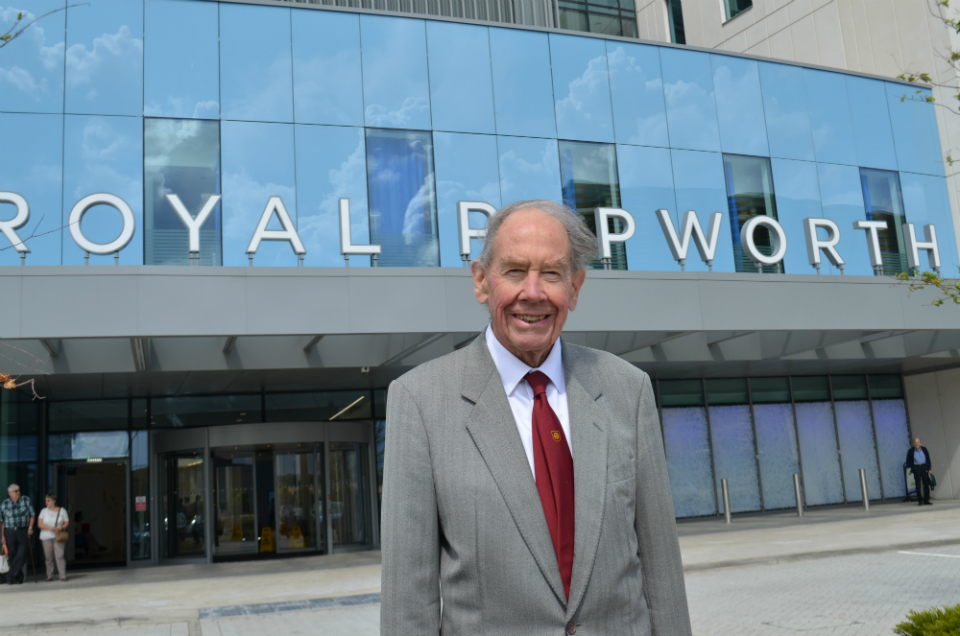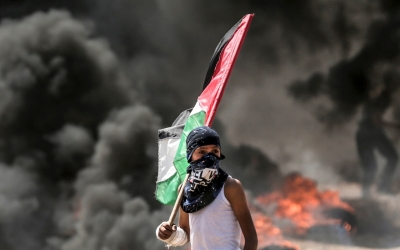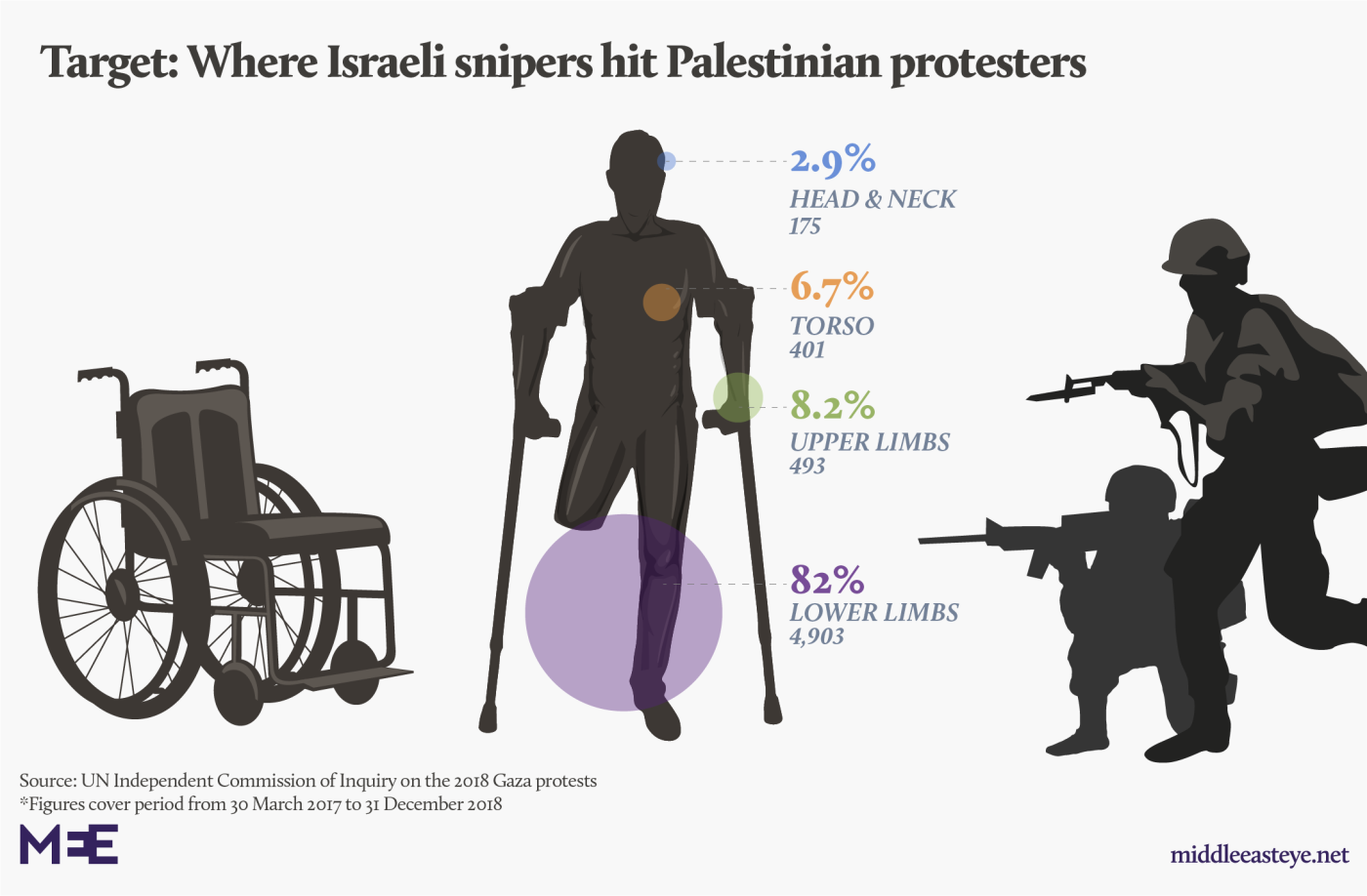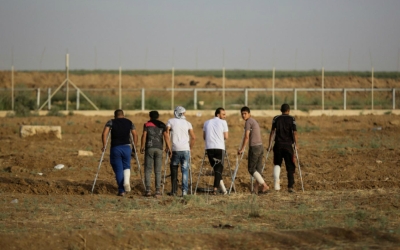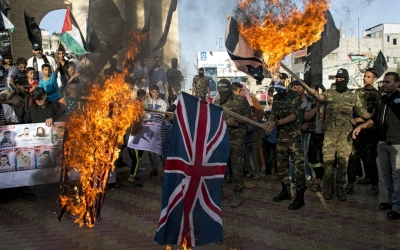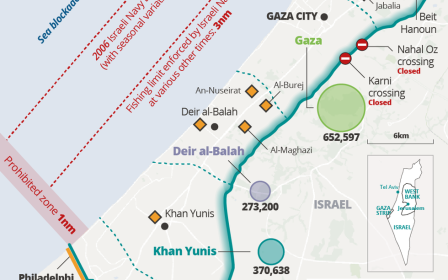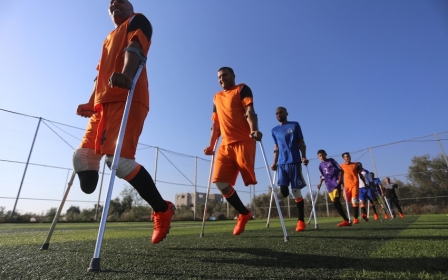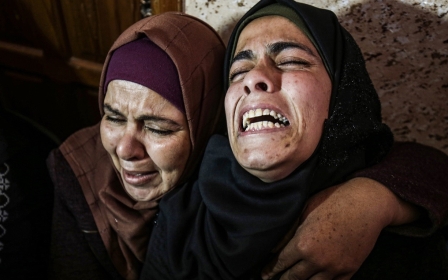Renowned British surgeon says Gaza 2018 protest injuries still untreated
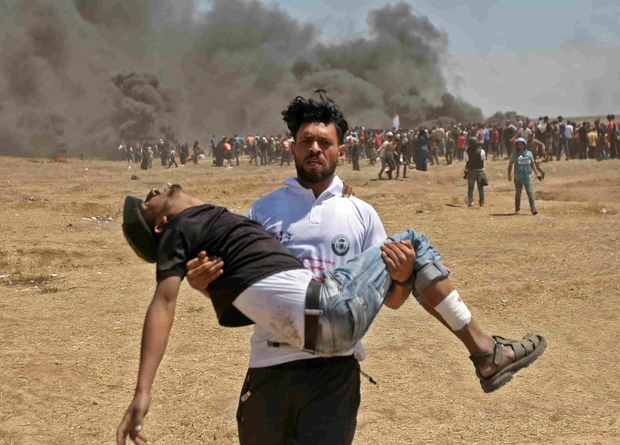
Terence English is a celebrated British surgeon. In 1979 he performed the first successful heart transplant in the UK.
He has served as president of both the Royal College of Surgeons and the British Medical Association, and as the master of St Catharine's College, Cambridge. In 1991 he was recognised for his surgical achievements with a knighthood.
So when he retired 20 years ago, loaded with honours, he was fully entitled to put his feet up and dedicate himself to gardening at his home in Oxford. Instead, Terence English went to Gaza.
He first became involved with establishing training programmes in primary trauma care for Palestinian doctors. Since then, he and his surgical colleagues have helped establish various medical projects and to train local doctors.
New MEE newsletter: Jerusalem Dispatch
Sign up to get the latest insights and analysis on Israel-Palestine, alongside Turkey Unpacked and other MEE newsletters
One of the most important of these projects has helped hundreds of people in need of complex limb reconstruction surgery.
Many of these patients were teenagers and young people who were shot in the legs by Israeli security forces as they took part in in the Great March of Return protests at the perimeter fence that hems in Gaza’s two million residents.
At least 190 people were shot dead over months of weekly protests, including at least 68 on 14 May 2018, when thousands of people in Gaza protested against the opening of the US embassy in Jerusalem.
On the second anniversary of the start of those protests, and with the situation in Gaza more desperate than ever and complicated by the spreading coronavirus pandemic, English, now 87, has decided to speak out for the first time.
The British surgeon is sufficiently well connected to have had a chance to raise his concerns privately with senior UK government ministers in recent years. Yet nothing has come of his efforts, he said.
“Gaza now presents a critical humanitarian crisis,” English told Middle East Eye.
The marches in Gaza began on 30 March 2018, when Ahmed Abu Artema, a Palestinian journalist, called on Palestinian refugees to gather peacefully near the fence to demand the right to return to the lands from which they were forced to flee or expelled during the events that led to the creation of Israel in 1948.
The Israeli response was violent. “When the protests at the fence started, there were enormous numbers of injuries,” English recalled.
“Teenagers and young men were being shot through the knee area by Israeli snipers on the other side of the fence using high velocity bullets.”
He describes horrifying injuries involving smashed bone and tissue. Others were killed.
Israel said it was protecting the fence from violent protesters and militants. English says that the people he helped were angry but peaceful demonstrators.
“The demonstration was supposed to be throughout the West Bank and Gaza to protest for the right to return, a need which is particularly acute in Gaza,” he said.
“Now a huge number of Palestinians have been disabled.”
For those who are successfully operated on, it can take up to six months before they are able to walk again and there is a long waiting list.
But many are not so lucky. “There were other cases where the only way of avoiding months of misery was to perform an amputation,” said English.
It is difficult to know precisely how many are still in need of surgery, but estimates are that 500 of these complex operations have been carried out with a further 700 people still awaiting treatment.
This is still an extraordinary achievement given the state of the health services in Gaza.
English said: “The first problem is the blockade, which makes it difficult to provide the necessary medical resources. The other issue is that conflict has destroyed a lot of the infrastructure. Hospital generators are unreliable, much of the water is undrinkable and medical supplies are in short supply.”
A few years ago, English recalls asking Dr Yousef Abu Reesh, Gaza’s deputy health minister, what serious gaps in healthcare provision needed addressing. Reesh laughed and replied: “Everything!”
Israel's blockade of Gaza has been in place since Hamas took control in 2007, after first winning legislative elections and then ousting Palestinian Authority President Mahmoud Abbas's Fatah from the coastal enclave following violent clashes between the rival factions.
Now English believes that the threat from coronavirus, with a number of cases already reported in the territory, makes the need to lift the blockade all the more urgent.
“Densely populated in a narrow strip of land and with a health service already under huge strain, there are fears that the virus would be impossible to control and have catastrophic effects,” he said.
“The people of Gaza are so very much more vulnerable. They live in very crowded conditions and there is no way they can self-isolate effectively.”
English believes that the British government has an obligation to do more for the Palestinians, because of its historic responsibility for the 1917 Balfour Declaration, in which it pledged to support the creation of a Jewish homeland in Palestine.
“The last sentence of the Balfour Declaration makes clear that providing a national home for Jews in Palestine should not 'prejudice the civil and religious rights of the existing non-Jewish communities in Palestine'. This is clearly not what has happened.
“I am saddened that Britain has not done more to honour its responsibilities for the Palestinians.”
His message is clear: “We have to pressure our parliamentarians to support the people of Gaza. Britain must take responsibility.”
One way in which English believes the British government could help is by talking to Hamas with the eventual aim of reconstructing a united leadership capable of representing all Palestinians in internationally-supported negotiations with Israel.
“It is in the interest of both peoples and our own, to break the cycle of conflict and suffering we have witnessed during the last 50 years,” the surgeon said.
Such a move would take diplomatic and political courage since Hamas's military wing has been a proscribed terrorist organisation in the UK since 2001.
The British government describes its policy towards Palestine as being the establishing of “a just peace between a stable, democratic Palestinian State and Israel, based on 1967 borders, ending the occupation by agreement”.
But English fears that such a policy is in danger of being outpaced by events, as Israeli Prime Minister Benjamin Netanyahu, emboldened by the support of US President Donald Trump and domestic political machinations that look set to keep him in office, threatens to further undermine the prospects of any meaningful future agreement - with Palestinians suffering once again.
“Inevitably health services depend on politics,” English said.
“With Trump in office, Netanyahu believes he can do more or less what he wants and with him back in power he may aim to annex what remains of the West Bank.”
Middle East Eye delivers independent and unrivalled coverage and analysis of the Middle East, North Africa and beyond. To learn more about republishing this content and the associated fees, please fill out this form. More about MEE can be found here.


